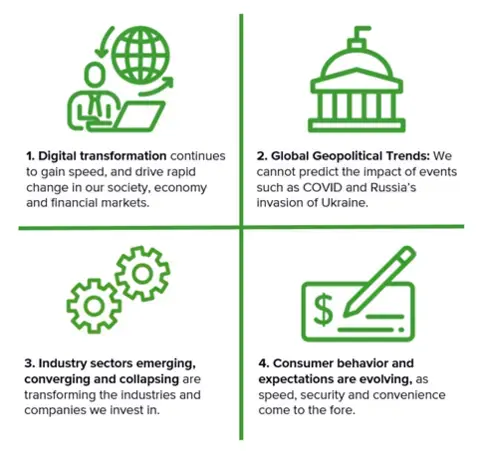For investors who have watched their purchasing power and portfolio values decline in recent years, it seems challenging to view inflation, market volatility and downturns through a constructive lens. Yet, it’s fair to say these conditions have provided investors with a masterclass in dealing with uncertainty and rapid change. When COVID-19 shut down the U.S. virtually overnight in March 2020, it changed far more than our financial plans and how we invest. It changed how we live, work, shop, socialize, and more.
For over a decade, we've talked about how our world's pace of change is accelerating. In some ways, the future arrived more quickly than any of us thought—and with dramatic impact. Entire industries shifted overnight. Tech companies like Amazon, Google and Zoom soared in value while companies in the travel and hospitality industries struggled. Industries and organizations heavily dependent on our aging global supply chain infrastructure especially took a beating.
The pandemic changed our world at unprecedented speed, but here’s the part many people don’t talk about: In many ways, this accelerated pace of change is here to stay. What does this quickening mean for investors, particularly those looking to take advantage of long-term investment horizons?
Investors must consider whether the companies they buy into will be around long-term. In 1965 the average lifespan of a company on the S&P 500 Index was 32 years. Fast-forward to 2020, that lifespan was around 21 years, a drop of more than 34%, according to Statista. And long-term trends point to further declines in corporate longevity.
As investors witnessing this unprecedented reality, how do we anticipate and prepare our finances in the face of future disruptions?
Figure 1. Four Global Trends Driving the Rapid Pace of Change

Not surprisingly, these global trends and others have significantly impacted every industry. These long-term, large-scale shifts have a significant impact on societies and economies around the world. These trends drive demographic changes, environmental issues, and ongoing geopolitical modifications. Investment advisors pay close attention to these megatrends, as they can profoundly affect the financial markets and investment opportunities.
For example, the rise of technology has led to the emergence of new industries and investment opportunities, such as the growth of the gig economy and e-commerce. Demographic changes—for instance, aging populations—can impact demand for certain products and services, such as health care and retirement solutions. Environmental concerns have also become an important consideration for investors, as climate change and other sustainability issues can affect the performance of companies and industries. By understanding and responding to global trends, investors can identify potential risks and opportunities and make informed investment decisions.
Looking forward to financial confidence? Schedule your complimentary consultation with a Wealth Enhancement advisor.
8 Trends Shaping the Future of Investing
Trend #1: Artificial Intelligence, Robots and Automation

If you’ve been paying attention to the news lately, you’ve likely heard all kinds of buzz surrounding chatbots and artificial intelligence (AI). When they work, AI chatbots can be massive efficiency boosters, helping to comb through and consolidate vast amounts of data and translate it into something digestible and usable. They can be more than a little unsettling when they don't work as planned.
Vague threats and declarations of love notwithstanding, AI has already made its mark on the world at large. Virtual assistants like Amazon’s Alexa and Apple’s Siri represent forms of AI and automation that have firmly rooted themselves in our collective consciousness. But AI can do more than just tell you the local weather forecast or what time it is in Sydney, Australia. Every day, companies across every industry, including investing, are either working to develop AI technology or implementing it to increase productivity. Additional use cases are growing rapidly, as AI can help summarize conference calls, write explanatory research primers, and more.
If those seem like table stakes or minor improvements, consider how the outcomes of AI chatbot competitions can drastically impact companies. In reaction to the incredible popularity of ChatGTP, Google offered a preview of its chatbot, called Bard, in February. When the prerecorded demo showing Bard’s capabilities produced a very public factual error—an expected outcome, as AI algorithms are “trained” on new information rather than coming up with anything themselves—shares in Alphabet, Google’s parent company, fell more than 7%. This massive drop erased over $100 billion from the company's market value.
How It’s Changing Investing
A benefit of increased automation and AI in investing is in the productivity gains and the potential for reducing some of the emotion that often accompanies investment decisions. When you have data like predictive analysis at the snap of your fingers, it can make it much easier to choose a course of investment action because you can rely on historical data and market trends to guide your decisions.
However, a significant drawback is the loss of the human element. While certainly capable of crunching massive amounts of data in minutes or seconds, AI lacks the ability to demonstrate empathy for investment losses or advise a person or family in need of investment advice during a difficult time in their lives.
Clearly, AI-powered chatbots have a long way to go before they might replace human advisors. But using AI in finance to improve customer service, streamline routine tasks and enable human advisors to focus more on their craft is an exciting development for investors and financial professionals.
Trend #2: Financial Services in the Metaverse

The metaverse is expected to be the next generation of the internet, where our digital and physical lives combine seamlessly into one. Facebook and parent company Meta have long talked about the transformational innovations possible in the metaverse, going so far as pledging to hire 10,000 workers in the EU to help bring their vision to life. Still, so far, not much has materialized.
Much of the hype surrounding the metaverse has died down since it was first bandied about. Still, there are already examples of such things today, such as when the popular online video game Fortnite hosted a virtual concert, resulting in thousands of players logging in to view it. The metaverse is expected to be a more immersive version of today's internet. Many of our children are already growing up in this world, with video games like Minecraft, Roblox and Fortnite prime examples. Just as many Millennials never knew a world without Google, many children growing up now will be very comfortable in an immersive, virtual world.
How It’s Changing Investing
The potential of the metaverse is tantalizing, to say the least, as there are countless possibilities for this “blended” reality. Investors from around the globe could gather in a virtual stadium and see the digitized factory improvements made to an auto assembly line or the microscopic changes made to a drug in a biotech company’s pipeline that could change how the cells react to it. Financial details could be brought together into one place without the hassle of passwords. The applications of the metaverse in investing seem limited only to the imaginations of those creating the technology.
However, it will be costly to build out this virtual world, and it will take time to define and realize how it can be integrated into our daily lives. The potential profitability of investing in the metaverse still needs to be clarified.
Trend #3: Rise of the Robo-Advisors

If you’ve ever visited a website and entered investment-related information such as your risk tolerance, expectations for returns, and income needs and received guidance—all without speaking to a human being—then you’ve dealt with a “robo-advisor.” Robo-advisors are a form of AI that can run complex calculations in seconds and assist in making more basic investment decisions.
Their ease of access (anyone can go online in the middle of the night or on the weekend) and use provides virtually unmatched convenience. However, whether you can trust a robo-advisor with your financial future depends on your situation and investment needs.
How It’s Changing Investing
Robo-advisors are already established in the world of investing, as many of the larger investment companies have apps and other online tools to guide your investments. Robo-advisors can be great for people who are just getting started with investing. Generally, these programs can help you project how much you need to save to meet a certain goal, and they can offer guidance on how much you should save each month to meet that goal.
However, as with AI, robo-advisors cannot address family dynamics, tax and legal needs, and other nuanced financial situations like traditional advisors. And while new investors or budget-conscious investors may benefit from robo-advisors, more experienced investors will likely prefer the personal care and attention a human advisor offers.
Trend #4: Protecting Wealth from Emerging Risks

In an uncertain world, insurance and risk management are increasingly important in our daily lives, especially with climate change creating more extreme weather events. As new technologies emerge, we constantly find ourselves vulnerable to new and more serious threats. Therefore, we must also find new ways to protect ourselves from these burgeoning threats.
And it's not just consumers who are finding ways to utilize technological advances. Many insurance companies can assess their risks using predictive software, which can estimate such things as when sea levels might rise in a certain neighborhood or how winds are shifting and might make a new neighborhood more prone to fire damage. This allows insurance companies to reprice their policies and adjust accordingly.
How It’s Changing Investing
Risk management is vital, as protecting what you built and earned is an aspect of wealth planning you must address. Insurance lets us know we are covered “just in case.” This provides some relief when a loved one unexpectedly passes away (and life insurance can provide financial assistance) or when homeowner’s insurance covers damages from a fallen tree. But a lot must be considered when evaluating risk management and insurance, and you need to ensure that your insurance can keep up with your assets. As your investment portfolio grows and changes, this becomes increasingly important.
Preparing for unforeseen circumstances is critical to the risk management process. Lessening the damage these circumstances can cause is the reward.
Trend #5: The Growth of Sustainable and ESG Investing

The wave of innovation and digital transformation that gave birth to today’s era of tech giants is now turning towards solving climate change and other global challenges. As a result, we're seeing more and more companies acting more socially and environmentally conscious. And with this more significant emphasis on values and ethics in the corporate space, investors are noticing.
A trend that has grown increasingly popular in recent years is sustainable investing. Put simply, it means investing in companies working to create a better future, and many investors are putting this into practice to build a more ethical portfolio. An offshoot of sustainable investing is environmental, social and governance (ESG) investing, which focuses on companies actively trying to benefit society and limit their negative environmental impact.
Many companies have reduced the use of plastic packaging or are looking to exchange a portion of their transportation fleet for electric or hydrogen-powered vehicles. This creates demand for ecologically sustainable products and services, which can provide opportunities for companies that can help support these endeavors.
How It’s Changing Investing
Though a relatively new trend, sustainable and ESG investing is already making its presence felt, as renewables financing topped fossil fuel lending for the first time earlier this year. There are also potential benefits to investing this way, including lower risk and higher returns. Still, it should be noted that the tracking period for such studies was relatively short, so more data is likely needed before making any definitive claim. However, one very real benefit from sustainable or ESG investing is the greater sense of purpose and the belief that your investment dollars are going to a company striving to do good.
On the flip side, many companies have been called out for "greenwashing,” the practice of making false or exaggerated claims about the environmental benefits of their products or services to mislead consumers and improve public perception. Because of this, it’s up to the investor to do their due diligence to ensure the companies in which they’re investing are true to their claims and on the up and up.
Trend #6: Private Equity and Venture Capital Investment Opportunities

Private equity and venture capital investors work with companies that are not publicly traded. Because they are private, they are often viewed as riskier and less liquid investments. However, they also provide access to private markets. They can allow people to become early investors in a company before the company goes public or benefit when a private company is sold to another private company.
Companies such as iCapital or CAIS provide platforms that link advisors to private equity, real estate, alternative income and other investments. This allows advisors to have a portal to get documents, fact sheets, presentations, and additional information about each potential investment.
How It’s Changing Investing
There is research that shows that investing in private equity and venture capital helps to diversify investments, and firms have been tailoring solutions that would fit accredited investors who understand the complexity of these investments. Additionally, having access to private markets vs. public markets and the potential to invest in some of these companies at earlier stages can help you get your foot in the door at the ground level.
The drawbacks would be that some companies in the early stages have yet to prove their business model and generate positive earnings. Further, the liquidity associated with private markets means that trades take longer than one or two days, so moving money around will be more difficult.
Trend #7: The Growth of Online Marketplaces for Alternative Investments

Alternative investments are broad, but most experts view them as anything outside of your traditional stocks and bonds. This would include alternative income or credit funds, private equity, venture capital, real estate, and/or hedge funds. Given the experience of 2022, when both stocks and bonds performed poorly, alternatives were billed to diversify beyond the more traditional 60/40 portfolio (60% stocks and 40% bonds).
However, alternative investments can also encompass more outside-the-box options. Think cryptocurrency, non-fungible tokens (NFTs), collectibles like baseball or Pokémon cards, art, and wine. As the investment world continues to become more digitized, more and more platforms are popping up online to help facilitate the trade of these types of investments.
How It’s Changing Investing
Online marketplaces for alternative investments provide a one-stop portal for accessing the information on a wide selection of alternatives. Whether you’re looking to buy real estate or a 1952 Mickey Mantle card, there’s something online for you. The drawback, at least in terms of investment funds, is that the funds usually listed on the online marketplace have a revenue-sharing agreement with the online marketer.
Trend #8: Evolving Role of Wealth Management & Financial Advisors

In the last couple of decades, the role of the financial advisor has shifted because clients' needs have changed. Previously, people simply worked with investment advisors to handle their retirement and investment accounts. But over the years, firms started to offer more holistic advice to address their clients' wide-ranging and complex needs. While this initially started as a tactic to attract the ultra-wealthy, this service model has been adopted across the industry.
Moreover, there’s reason to believe that the financial services industry may again be at the center of an identity crisis in the coming years. A recent study from ICI Research found that more than one-third of 401(k) plan participants are under the age of 40, meaning advisors need to start looking for ways to appeal to Millennials and Generation Z. The number of people in these demographics seeking financial advice is increasing. It's already well established that these younger generations are more tech-savvy and use digital tools to do almost everything. However, the desire for human connection has remained, so financial advisors have a unique opportunity to seize these digital trends to capitalize on a younger, digital-savvy generation of clients.
How It’s Changing Investing
Wealth management firms will need to become more flexible as they adapt to the changing demographics of prospects and clients. They’ll still need to provide comprehensive financial planning solutions, but how they deliver this advice will need to change. Financial advisors will need to ask themselves a few questions:
- How can we integrate the human element into digital tools?
- How can we make ourselves more available to clients to meet on their terms?
- How can we communicate our value proposition in a way that sets us apart from other similar firms?
The answer, for now, looks to be a hybrid approach that combines digital tools with traditional face-to-face interactions. In the future, apps will likely become more advanced and capable of providing real-time answers to client questions, instant breakdowns of all types of financial accounts, and the ability to connect clients directly to their advisors.
How to Capitalize on These Trends
It's said that change is the only constant. The rapid evolution of key industries and economic sectors means we must rethink how we invest. For some, that means AI and robo-advisors. For others, it means using our values and principles to guide the companies we invest in. Investors don't have to be technology experts, but they must understand its influence on investing and the world.
Additionally, our definition of risk is changing in a world of increasing volatility. Recall how quickly the lifespan of S&P 500 companies is declining. The risk of investing in emerging companies and markets must be balanced against investing in legacy companies and industries on their way out. This is just one example of how your wealth could be vulnerable in the face of newer, unforeseen threats, so it's paramount that you consider all how you can protect your wealth.
As you accumulate wealth, your investing options widen. At the same time, your situation becomes more complex, and it’s critical to have a comprehensive plan. The role of the financial advisor is changing to adapt to these more complex needs, but you need to make sure you partner with an advisor who can take a holistic approach to all aspects of your wealth. More than ever, it's crucial to have an advisor and a long-term plan to cope with ever-changing industries, and your advisor can help keep an eye on rapidly evolving industries and companies. Because an experienced advisor knows your personal situation, investment goals and horizons, they can help spot opportunities and challenges relevant to your financial situation.
At Wealth Enhancemen, our Roundtable™ team of advisors collaborates with specialists from across the country and all disciplines of finance, considering every aspect of your unique situation and crafting a comprehensive financial plan customized to you and only you. We keep abreast and informed of these trends shaping the future of investing, and we work to incorporate them, where appropriate, into the personal care we extend to all clients. Reach out today to meet with an advisor or schedule a free consultation.




